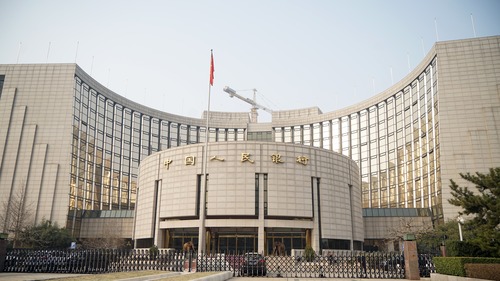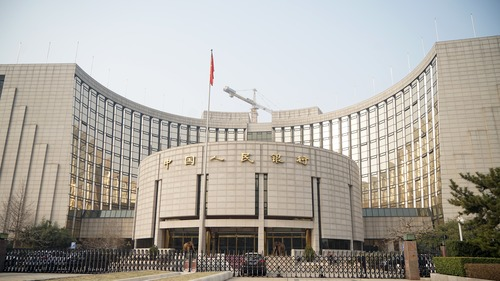
Photo shows the headquarters of the People's Bank of China. (Xinhua/Cai Yang)
BEIJING, Jan. 12 (Xinhua) -- In the past year of 2021, the domestic RMB bonds held by overseas institutions hit a record high.
According to data released by China Foreign Exchange Trade System on January 7, foreign institutional investors bought 89.7 billion yuan of the bonds in December 2021, bringing the RMB bonds held by overseas institutions to more than four trillion yuan in the whole year of 2021.
It is a big surge that indicates a considerable wider and higher-level opening-up of China's bond market to the world.
China's bond market has opened to the outside for nearly 20 years. In particular, it accelerated opening-up and embraced global financial market and investors in 2021. The southbound trading under China's Bond Connect program was launched and a series of opening-up measures such as tax exemption policy were rolled out, marking China's faster opening-up in greater intensity.
In the future, the bond market will be further opened. Insiders expect that products in the bond market or the credit and exchange rate derivatives and risk hedging mechanisms in bond investment will enjoy huge potential.
-- Ever-changing RMB bond market
For China's bond market with a size of more than 130 trillion yuan, the four trillion yuan only takes up a small part, but it represents a distinct hallmark of the ever-changing RMB bond market.
Statistics showed that overseas investors significantly increase their share in China's bond market. By the end of November 2021, bonds in China's interbank market held by overseas institutions totaled 3.93 trillion yuan, accounting for nearly 3.4 percent of the total in custody, of which the treasury bonds held by overseas institutions accounted for around 10 percent of book-entry treasury bonds. However, both of the two figures in 2015 were around 2 percent.
The eye-catching transaction value is also a testament to the "new feature" of China's bond market.
The total transactions of the Bond Connect in 2021 topped 6.44 trillion yuan, up 35 percent year on year. In particular, December 16, 2021 witnessed the record high transaction of 51 billion yuan for a single day, while the total transaction of the Bond Connect from July 2017 to May 2018 was only 2.5 billion yuan.
The RMB bonds have also been included in global bond indexes. On October 29, 2021, China's government bonds were included in the FTSE World Government Bond Index (WGBI). Henceforth, Chinese bonds had been included in all the three major global bond indexes, marking the higher-level opening-up of China's bond market.
-- Creative institutional opening-up measures
The inclusiveness of China's bond market is driven by a series of creative institutional opening-up measures.
In order to meet the need of the overseas institutions to invest in domestic bonds, the People's Bank of China (PBOC) issued in August 2010 a notice for the pilot program on investment in the interbank bond market with RMB funds by three types of institution including overseas RMB clearing banks, marking the opening-up of China's interbank bond market.
In February 2016, the PBOC issued measures to allow various types of financial institutions to invest in the interbank bond market, carry out spot transaction of bonds as well as transaction of bond forward based on hedging need, and cancel investment quotas, marking the all-round opening-up of China's bond market.
Then opening-up systems and policies were rolled out intensively.
In July 2017, the Bond Connect was put into operation, and the northbound Bond Connect firstly launched supplemented the approaches for overseas small- and medium-sized investors to directly enter into China's bond market.
In May 2020, the PBOC and the State Administration of Foreign Exchange (SAFE) jointly announced the cancellation of restrictions on remittance time and proportions of QFIIs' investment incomes, further dispelling overseas investors' concern about "easy capital inflow but hard capital outflow".
In 2021, the two-way, high-quality opening-up of China's bond market took shape.
On September 24, 2021, the southbound Bond Connect was formally launched, marking the two-way launch of the Bond Connect. On October 27, 2021, the State Council decided to extend the exemptions of corporate income tax and value-added tax on bond interest for overseas investment in domestic bond markets until the end of 2025.
On August 17, 2021, the six departments, including the PBOC, jointly issued the opinions on promoting high-quality development of reform and opening-up of corporate credit bond market. Insiders hold that the issuance of the opinions will facilitate the high-quality development of the corporate credit bond market, and accelerate the formation of an unified open bond market.
-- Expected broader opening-up
China still boasts a vast space for the opening-up of its bond market.
"The opening-up of the bond market is a systematic improvement process at various levels and in different aspects," said Zhang Jinqiu, vice president of HSBC Bank (China) and co-director of its Global Capital Markets.
Zhang suggested the details of the operation framework of the bond market should be improved based on the existing system, including the adjustment and improvement of infrastructure at a deeper level. For instance, keeping the transition pace of the London Inter-Bank Offered Rate or LIBOR in the international market, China should continue to widen the application of the short-term benchmark rate.
Zhang also proposed that China should further develop and explore the market maker system, and promote the high-quality development of intermediary service institutions, such as narrowing the gap between domestic and foreign settlement intervals.
"China should further open its market of bond derivatives. For instance, treasury futures market and bond repurchase market should be opened to overseas investors, facilitating their investment and risk control," said Liu Linan, head of Greater China Macro Strategy at Deutsche Bank.
Gao Zhanjun, senior research fellow of National Institution for Finance & Development, said that China still has a vast space for the opening-up of its bond market. For instance, the depth, width and resilience of the bond market are inadequate. Most of bonds are based on government credit, and domestic rating is not geared towards international rating. There is still a long way to build a truly mature bond market.
With the wider opening-up of the bond market, the credit bond market is expected to become the new magnet for international investors.
With the improving credit rating system and the introduction of hedging tools of credit risks in China, some overseas investors take a keen interest in domestic credit bond market, especially in the high-yield fields, said Ming Ming, deputy director of CITIC Securities Research Institute, adding that overseas investors were expected to hold a higher proportion of credit bonds in the future.(Edited by Yang Yifan with Xinhua Silk Road, yangyifan@xinhua.org)




 A single purchase
A single purchase









